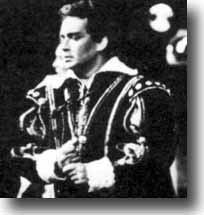Luisa Miller
New York Metropolitan Opera, November 1978

By Robert Jacobson, Opera News, January 27, 1979
The pleasure of Luisa Miller's company came with its first revival-incredibly, since the 1971-72 season (Nov. 20). Again, James Levine was at the helm, bringing a new intensity to this rich score, fierce in its taut dramatic edge, grand in its theatrical climaxes and sure-handed in its sense of mounting ensemble. Onstage, things turned a bit sleepy here and there, for Katia Ricciarelli in the title role went through the motions, charming in the early scenes but remote in the more dramatic demands. Acting sympathetically and looking ravishing, she produced some enchanting soft-grained sounds on top pianos, but often they emerged unsupported and without real vocal body, while missing a firm sense of legato and fullness in fortes. Tenor Carlo Bini, who had made his debut as Don José previously, displayed a voice of little intrinsic quality or beauty, sounding strident and opaque in the manner of a lyric voice pushed into heavy repertory, tending toward crude phrasing. True, he had mastered the part in a few short days to substitute for José Carreras, and he did act with agility and freedom. As Miller, Cornell MacNeil began with big Verdi vocalizing but flatted on the final interpolated A-flat of his cabaletta, and from then on he remained in severe straits. Paul Plishka made a compelling Count Walter, darkly sinister in action and imposing in bass outpouring. James Morris lent vocal magnitude as Wurm, but Mignon Dunn found it difficult to emerge from the quagmire of Federica's curious vocal line. With highly attractive new costumes by Charles Caine, this Nathaniel Merrill- directed production resurfaced in fine fettle.
With the return of Carreras [heard Dec. 9), Miller took on quite a healthier complexion-that of inspired grand opera. In an electric evening on all fronts, the presence of the Spanish tenor seemed to spur Miss Ricciarelli on to a truly memorable portrayal, one in which her pianissimos of poised, unearthly beauty-spun like white gold were matched by an unerring sense of drama speaking real passion and desperation. With her and Carreras, two of the most beautiful voices in opera were heard, for he sounded superbly focused as he anchored tonal weight through the range, playing Rodolfo with intelligence and intensity. Mario Sereni was the new Miller, radiating sympathy and singing firmly. John Cheek's Wurm sounded weak and had little personality.
This page was last updated on: May 17, 2005